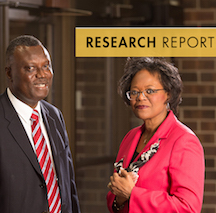 A study conducted by researchers at the School of Nursing at the University of Wisconsin-Milwaukee found widespread distrust of genetic testing among African Americans. “The memory of Tuskegee is ingrained in us,” said Patricia McManus, president of the Black Health Coalition of Wisconsin.
A study conducted by researchers at the School of Nursing at the University of Wisconsin-Milwaukee found widespread distrust of genetic testing among African Americans. “The memory of Tuskegee is ingrained in us,” said Patricia McManus, president of the Black Health Coalition of Wisconsin.
This distrust of the medical establishment is a major barrier to encourage the participation of Black subjects in research that could lead to treatments for afflictions that disproportionately affect African Americans, such as sickle cell disease, diabetes, certain types of cancer, and hypertension.
Professors Aaron Buseh and Sandra Millon-Underwood conducted a detailed, community-based study exploring perceptions and attitudes about genetic research among African-Americans and African immigrants in Milwaukee. They asked participants about their knowledge of genetics, their sense of possible benefits and disadvantages of genetic research, and their willingness to provide samples (such as blood and tissue) to biobanks for use in future research.
The study revealed deep concern about genetic testing among African-Americans and African immigrants, even among those with a high level of education.
“Building trust starts when the affected people can say that the scientists came to them instead of scientists asking people to leave their community and step into a lab or clinical setting,” said Professor Buseh. He recommends that researchers hold “genetic cafes” in minority communities to educate residents about genetics and how research can help solve health problems. He also hopes to hold a summer camp for minority teenagers to teach how to research their family’s health history so that they have a better idea how genetics may impact their own health. With this knowledge they can make lifestyle choices to reduce their risk of disease.
The report, Trust Is the Key to Boosting Diversity in Genetics Research, can be viewed here.

